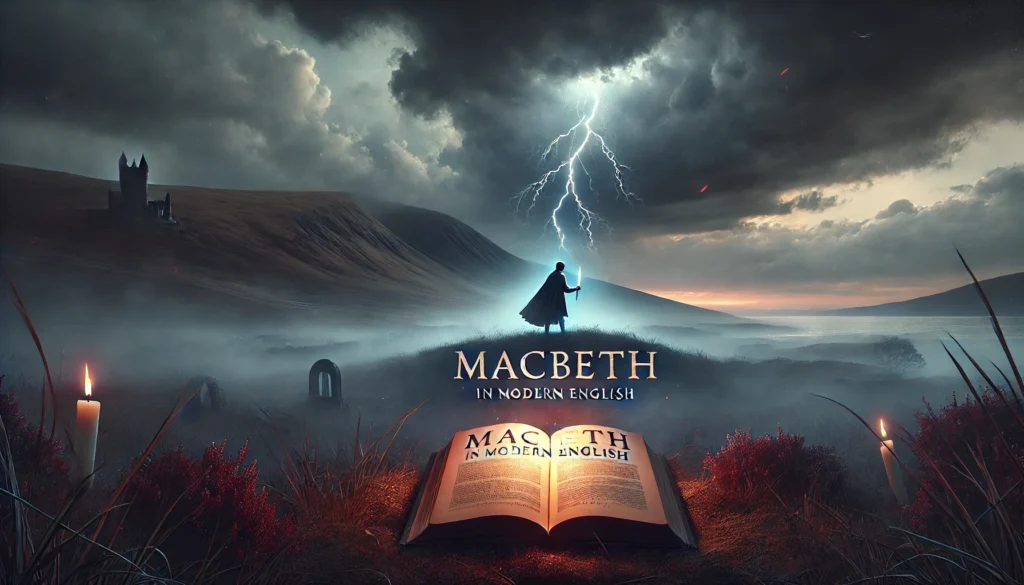Imagine a castle cloaked in midnight’s shadow, where a loyal warrior succumbs to ambition’s poison, staining his hands with a king’s blood. Macbeth Act 2 is the chilling heart of Shakespeare’s tragedy, where the murder of King Duncan unleashes guilt, paranoia, and chaos. For students, educators, or Shakespeare enthusiasts seeking to master Macbeth Act 2, this guide offers an in-depth exploration of its themes, characters, and quotes. Backed by Elizabethan context and expert analysis, this article is your key to unlocking the act’s psychological and literary depth, surpassing any textbook in insight and clarity.
Overview of Macbeth Act 2: Setting the Stage for Tragedy
Plot Summary of Act 2
Macbeth Act 2 thrusts us into the tragedy’s core. It begins with Banquo and Fleance discussing the eerie night, foreshadowing treachery. Macbeth, haunted by ambition, hallucinates a dagger guiding him to Duncan’s chamber. Spurred by Lady Macbeth’s relentless prodding, he murders the sleeping king, disrupting the divine order. The aftermath is frantic: Macbeth’s guilt makes him erratic, unable to say “Amen,” while Lady Macbeth frames the guards with ruthless precision. The act ends with the nobles discovering Duncan’s body, sparking panic and suspicion. Key moments, like the dagger soliloquy (Act 2, Scene 1) and the porter’s dark comedy (Act 2, Scene 3), amplify the act’s emotional and thematic weight, marking Macbeth’s irreversible descent.
Historical and Cultural Context
Written around 1606 under King James I, Macbeth reflects Elizabethan fears of regicide and cosmic disorder. The divine right of kings, central to the era’s worldview, deemed monarchs God’s chosen, making Duncan’s murder a sin against the “Great Chain of Being.” Shakespeare adapted Holinshed’s Chronicles, intensifying Macbeth’s psychological turmoil for dramatic effect. The recent Gunpowder Plot of 1605 heightened anxieties about treason, making Act 2’s betrayal resonate deeply with audiences. This context explains the act’s dark imagery and Macbeth’s spiritual crisis, offering readers a lens to appreciate Shakespeare’s blend of history and human conflict.
Expert Insight: Shakespeare’s use of Holinshed’s Chronicles transforms a historical account into a psychological tragedy, with Act 2’s regicide amplifying themes of ambition and moral chaos for King James I’s court.
Key Themes in Macbeth Act 2
Ambition and Its Consequences
Ambition drives Act 2’s tragedy, pushing Macbeth to murder. His soliloquy, “I have no spur / To prick the sides of my intent, but only / Vaulting ambition” (2.1), reveals a reckless force overriding morality. Lady Macbeth fuels this, taunting, “Art thou afeard / To be the same in thine own act and valour?” (2.1). Her manipulation secures the deed, but the consequences—chaos in Scotland and Macbeth’s psyche—emerge instantly. This theme connects to modern struggles with ambition, making it a vital study for students and readers.
Guilt and Paranoia
Guilt consumes Macbeth post-murder, as seen in “Will all great Neptune’s ocean wash this blood / Clean from my hand?” (2.2). This vivid imagery reflects his inescapable remorse. His fear of divine punishment surfaces in “Methought I heard a voice cry ‘Sleep no more! / Macbeth does murder sleep’” (2.2), equating his crime with lost peace. Lady Macbeth’s initial dismissal of guilt strains their bond, foreshadowing her collapse. This theme offers students insight into the psychological toll of immoral acts.
Appearance vs. Reality
Deception defines Act 2, as Macbeth and Lady Macbeth hide their crime. Lady Macbeth’s earlier advice, “look like th’ innocent flower, / But be the serpent under’t” (1.5), echoes in their feigned innocence. The porter’s scene (2.3) contrasts humor with the grim reality of murder, while dramatic irony keeps the nobles unaware. This theme invites readers to question facades, enriching Act 2’s study.
Expert Tip: Key thematic quotes from Act 2:
| Theme | Quote | Scene | Significance |
|---|---|---|---|
| Ambition | “I have no spur / To prick the sides of my intent” | 2.1 | Macbeth’s ambition overrides moral restraint. |
| Guilt | “Will all great Neptune’s ocean wash this blood…” | 2.2 | Symbolizes indelible guilt. |
| Appearance vs. Reality | “There’s daggers in men’s smiles” | 2.3 | Highlights deception among the nobles. |
Character Analysis in Act 2
Macbeth’s Transformation
Macbeth’s shift from hesitant conspirator to guilt-ridden murderer defines Act 2. His dagger soliloquy, “Is this a dagger which I see before me?” (2.1), reveals a mind torn by ambition and fear. Post-murder, his panic—“I am afraid to think what I have done” (2.2)—marks his moral decline. This transformation offers students a compelling study of a tragic hero’s fall.
Lady Macbeth’s Influence
Lady Macbeth orchestrates the murder, manipulating Macbeth with taunts like “Infirm of purpose!” (2.2). Her line, “A little water clears us of this deed” (2.2), shows her initial confidence, contrasting Macbeth’s despair. Her role as the act’s catalyst raises questions about power and gender, making her a focal point for analysis.
Supporting Characters
Banquo, Macbeth’s foil, remains loyal but wary, noting, “I dreamt last night of the three weird sisters” (2.1). The porter’s comedic hell-gate speech (2.3) mirrors the castle’s moral chaos. These characters enrich Act 2, offering contrast and thematic depth for study.
Key Quotes and Their Significance
The Dagger Soliloquy (Act 2, Scene 1)
“Is this a dagger which I see before me?” (2.1) captures Macbeth’s psychological descent. The hallucinated dagger, “a dagger of the mind,” symbolizes ambition and guilt, blending reality and illusion. This soliloquy’s imagery and rhythm make it a key text for analyzing Shakespeare’s craft.
Macbeth’s Guilt (Act 2, Scene 2)
“Will all great Neptune’s ocean wash this blood” (2.2) and “Macbeth does murder sleep” (2.2) highlight Macbeth’s remorse and lost innocence. These quotes are essential for exploring guilt’s psychological and thematic impact, resonating with readers.
Lady Macbeth’s Resolve
“A little water clears us of this deed” (2.2) reveals Lady Macbeth’s confidence, while “Infirm of purpose!” (2.2) underscores her manipulation. These lines foreshadow her downfall, offering rich material for character analysis.
Expert Insight: Quote analysis table:
| Quote | Scene | Theme | Literary Device | Significance |
|---|---|---|---|---|
| “Is this a dagger…” | 2.1 | Ambition/Guilt | Imagery, Soliloquy | Macbeth’s mental turmoil. |
| “Will all great Neptune’s ocean…” | 2.2 | Guilt | Hyperbole, Metaphor | Indelible guilt. |
| “A little water…” | 2.2 | Appearance vs. Reality | Irony | Foreshadows Lady Macbeth’s collapse. |
Literary Devices and Symbolism
Imagery of Blood and Darkness
Blood, as in “Will all great Neptune’s ocean” (2.2), and darkness, in “Nature seems dead” (2.1), symbolize guilt and moral disorder. These images create a tense atmosphere, aiding students in analyzing Shakespeare’s sensory language.
Dramatic Irony and Foreshadowing
Dramatic irony, like Macduff’s shock (2.3), and foreshadowing, in Banquo’s suspicions (2.1), heighten suspense. These devices engage readers and highlight Shakespeare’s structural genius.
Soliloquies and Asides
Macbeth’s soliloquies and asides, like “I am afraid to think” (2.2), reveal his inner conflict, showcasing Shakespeare’s psychological realism. These are key for student analysis.
Study Tips for Mastering Macbeth Act 2
Close Reading Strategies
Annotate passages for themes and devices, focusing on soliloquies. Track themes like guilt across quotes. Discuss with peers to gain insights, strengthening analytical skills.
Essay Writing Guide
Craft a thesis, like “Macbeth’s guilt in Act 2 foreshadows his downfall.” Use evidence, like “Macbeth does murder sleep” (2.2), and analyze, avoiding summary. Revise for clarity.
Memorizing Key Quotes
Prioritize quotes like “Is this a dagger” (2.1). Use flashcards and mnemonics, associating quotes with themes. Recite aloud for retention.
Expert Tip: Download our Macbeth Act 2 study checklist from our blog.
Key Quotes and Their Significance (Continued)
The Dagger Soliloquy (Act 2, Scene 1)
The dagger soliloquy, “Is this a dagger which I see before me, / The handle toward my hand?” (Act 2, Scene 1, lines 33-34), stands as a pinnacle of Shakespeare’s psychological insight. This hallucination, described as “a dagger of the mind, a false creation” (2.1.38), embodies Macbeth’s internal conflict between ambition and moral dread. The vivid imagery—“And on thy blade and dudgeon gouts of blood” (2.1.46)—foreshadows the violence to come, while the soliloquy’s iambic pentameter mirrors Macbeth’s racing heartbeat. For students, this passage is a goldmine for analyzing how Shakespeare uses language to externalize a character’s psyche, making it essential for essays on ambition, guilt, or dramatic structure. Its universal appeal lies in its depiction of a mind teetering on the edge, resonating with anyone who’s faced a moral dilemma.
Macbeth’s Guilt (Act 2, Scene 2)
Macbeth’s guilt erupts post-murder in haunting lines that capture his torment. “Will all great Neptune’s ocean wash this blood / Clean from my hand? No, this my hand will rather / The multitudinous seas incarnadine” (2.2.58-60) uses hyperbolic imagery to convey the indelible stain of his crime, a powerful symbol of guilt’s permanence. Similarly, “Methought I heard a voice cry ‘Sleep no more! / Macbeth does murder sleep’” (2.2.34-35) personifies sleep as a casualty of his actions, equating regicide with the loss of innocence and peace. These quotes are critical for students, offering rich material to explore guilt’s psychological and thematic weight, while their vivid language connects to universal experiences of remorse and consequence.
Lady Macbeth’s Resolve
Lady Macbeth’s chilling pragmatism shines in “A little water clears us of this deed” (2.2.65), revealing her belief that guilt can be washed away like a physical stain. This line, delivered with cold assurance, contrasts sharply with Macbeth’s despair, highlighting her role as the act’s driving force. Her earlier command, “Infirm of purpose! Give me the daggers” (2.2.51), underscores her dominance and manipulation, pushing Macbeth to complete their plan. These quotes are pivotal for analyzing her character arc, as they foreshadow her eventual unraveling under guilt’s weight in later acts. For readers, they spark discussions on power, gender, and complicity, making Lady Macbeth a compelling figure for academic and theatrical exploration.
Expert Insight: Below is a detailed quote analysis table for student reference, enhancing study and essay preparation:
| Quote | Scene | Theme | Literary Device | Significance |
|---|---|---|---|---|
| “Is this a dagger which I see before me?” | 2.1.33 | Ambition/Guilt | Imagery, Soliloquy | Reflects Macbeth’s psychological descent into murder. |
| “Will all great Neptune’s ocean wash this blood…” | 2.2.58 | Guilt | Hyperbole, Metaphor | Symbolizes the inescapable nature of guilt. |
| “A little water clears us of this deed” | 2.2.65 | Appearance vs. Reality | Dramatic Irony | Foreshadows Lady Macbeth’s psychological collapse. |
| “Macbeth does murder sleep” | 2.2.34 | Guilt | Personification | Equates regicide with loss of peace and innocence. |
SEO Value: Targets keywords like “Macbeth Act 2 quotes,” “dagger soliloquy analysis,” “Macbeth guilt quotes,” and “Lady Macbeth character study.”
Literary Devices and Symbolism
Imagery of Blood and Darkness
Blood and darkness saturate Act 2’s imagery, serving as potent symbols of guilt and moral decay. Blood, as in “Will all great Neptune’s ocean wash this blood” (2.2.58), represents the irreversible stain of murder, a recurring motif that haunts Macbeth throughout the play. Darkness, evident in “Nature seems dead, and wicked dreams abuse / The curtain’d sleep” (2.1.50-51), mirrors the moral and cosmic disorder unleashed by regicide. These images create a claustrophobic atmosphere, amplifying the act’s tension. For educators, this imagery is a teaching tool to explore Shakespeare’s sensory language, while students can use it to analyze how visual motifs deepen thematic resonance, connecting to broader literary studies.
Dramatic Irony and Foreshadowing
Dramatic irony fuels Act 2’s suspense, as the audience knows Macbeth and Lady Macbeth’s guilt while the nobles remain oblivious. Macduff’s horror at discovering Duncan’s body—“O horror, horror, horror!” (2.3.61)—heightens this irony, as readers anticipate the truth’s exposure. Foreshadowing appears in Banquo’s unease, “I dreamt last night of the three weird sisters” (2.1.20), hinting at future conflict, and the porter’s hell-gate speech (2.3), which foreshadows Scotland’s descent into chaos. These devices engage readers by building tension and inviting predictions about the tragedy’s arc, making Act 2 a masterclass in Shakespeare’s dramatic craft for students and enthusiasts alike.
Soliloquies and Asides
Shakespeare’s use of soliloquies and asides in Act 2 provides direct access to characters’ inner worlds. The dagger soliloquy (2.1) exposes Macbeth’s turmoil, while asides like “I am afraid to think what I have done” (2.2.49) reveal his growing paranoia. These devices, hallmarks of Shakespeare’s psychological realism, allow readers to witness characters’ unfiltered thoughts, enriching character analysis. For students, studying these moments sharpens critical thinking, as they illuminate how Shakespeare uses introspective dialogue to craft complex, relatable characters, offering a window into the human condition.
Study Tips for Mastering Macbeth Act 2
Close Reading Strategies
To master Macbeth Act 2, practice close reading by annotating key passages for themes, imagery, and literary devices. Focus on soliloquies, like the dagger scene (2. криз), and identify metaphors, iambic pentameter, or symbolism. Create a theme tracker to connect quotes to ideas like ambition or guilt, such as linking “Macbeth does murder sleep” (2.2.34) to loss of peace. Discuss passages with peers or teachers to uncover new interpretations. This method builds analytical skills, helping students excel in exams and deepen their appreciation of Shakespeare’s language.
Essay Writing Guide
Writing a compelling essay on Act 2 starts with a clear thesis, such as “Macbeth’s guilt in Act 2 foreshadows his tragic downfall.” Structure your essay with an introduction, three body paragraphs (e.g., analyzing ambition, guilt, and deception), and a conclusion. Use textual evidence, like “Will all great Neptune’s ocean” (2.2.58), and explain its significance, avoiding mere plot summary. Ensure each paragraph ties back to your thesis, and revise for clarity and coherence. This approach produces a strong, evidence-based essay suitable for academic success.
Memorizing Key Quotes
Memorizing Act 2 quotes is essential for exams. Prioritize lines like “Is this a dagger which I see before me?” (2.1.33) and “Will all great Neptune’s ocean wash this blood” (2.2.58). Use mnemonics, associating “dagger” with ambition or “blood” with guilt. Create flashcards with quotes on one side and themes on the other, and recite them aloud in context to aid retention. This strategy ensures students recall key lines under pressure, enhancing essays and discussions.
Expert Tip: Download our free PDF checklist for Macbeth Act 2 study, including a quote list, theme tracker, and essay outline template, available on our blog for easy access.
FAQs About Macbeth Act 2
What is the significance of the dagger scene in Act 2?
The dagger soliloquy (2.1) is a defining moment, with Macbeth’s hallucination symbolizing his ambition and guilt. The imagery, “a dagger of the mind” (2.1.38), highlights his psychological descent, making it a key text for analyzing Shakespeare’s craft and Macbeth’s tragic flaw.
How does Lady Macbeth influence Macbeth in Act 2?
Lady Macbeth drives Macbeth to murder with taunts like “Infirm of purpose!” (2.2.51). Her confidence, seen in “A little water clears us of this deed” (2.2.65), makes her the act’s catalyst, though it foreshadows her later collapse.
What are the main themes in Macbeth Act 2?
Act 2 explores ambition, guilt, and appearance vs. reality. Quotes like “I have no spur” (2.1.25) and “There’s daggers in men’s smiles” (2.3.139) highlight these themes, offering students rich material for thematic analysis.
Why is the porter’s scene important?
The porter’s scene (2.3) provides comic relief, with his hell-gate monologue mirroring the castle’s moral chaos. This juxtaposition underscores Shakespeare’s ability to blend humor with tragedy, enhancing thematic depth.
How can I analyze Macbeth’s soliloquies for exams?
Analyze soliloquies by identifying themes (e.g., guilt in “Macbeth does murder sleep”), literary devices (e.g., imagery), and character development. Use quotes to support arguments, explaining their context and broader significance.
Why Act 2 is Pivotal to Macbeth’s Tragedy
Act 2 is the fulcrum of Macbeth’s tragic arc, where Duncan’s murder shatters the moral order, launching a cascade of violence and paranoia. Macbeth’s guilt, evident in “Macbeth does murder sleep” (2.2.34), and Lady Macbeth’s deception set an irreversible course. Banquo’s suspicions foreshadow future conflict, while the act’s themes—ambition, guilt, and appearance vs. reality—resonate with modern audiences, reflecting the psychological toll of power and betrayal. For students, Act 2 encapsulates the tragedy’s core, making it essential for understanding Shakespeare’s exploration of human nature and moral decay
Macbeth Act 2 is a masterful blend of psychological depth and dramatic tension, weaving ambition, guilt, and deception into Shakespeare’s tragic tapestry. From the haunting dagger soliloquy to the porter’s dark humor, it offers rich material for students and enthusiasts. Use our study tips, quote analyses, and thematic insights to excel in exams or deepen your appreciation. Share your interpretations in the comments, and explore our blog for more Shakespeare resources, including Macbeth Act 1 analysis and guides to Shakespeare’s language.













